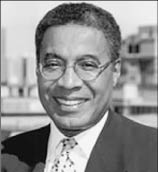 |
|
Poussaint: Told to keep mum about Baby Einstein. |
Lots of groups call themselves “youth advocates,” but in truth, few of them stick their necks out in ways that would create controversy or make their financial supporters skittish. The Campaign for a Commercial-Free Childhood (CCFC) has been causing controversies (and change) for a decade – but it recently got booted from its parent organization after it picked on the giant Walt Disney franchise.
The CCFC was forced to find a new home by the Judge Baker Children’s Center in Boston, which said it feared being sued by a big corporation because of the CCFC’s aggressive advocacy work.
Offending or scaring away supporters is a worst-case scenario that lurks for most hard-charging advocacy groups. “Any organization that expresses passionate concerns and calls for major changes in policy or practice can be attacked at any time. It can come from outside, and it come from within,” said Nancy Gannon Hornberger, executive director of the Coalition for Juvenile Justice, which almost sank a few years ago when the federal government cut off its funding. “It’s always a risk in being an advocacy organization.”
The level of that risk is affected by such things as the group’s corporate and financial structure. Some groups are set up in ways that somewhat insulate them from the fate that befell the CCFC.
Advocacy welcomed
The Baker Center – named for Harvey Humphrey Baker, the first judge of Boston’s juvenile court – is an affiliate of Harvard Medical School and was founded in 1917 to, in its own words, “promote research into the causes of delinquent behavior in children and to develop treatments.” Today the center employs 195 people on a $14.7 million annual budget, for activities that include training and advocacy.
To help fulfill the latter role, the CCFC was created 10 years ago as a project of Baker’s Media Center, which is directed by Alvin F. Poussaint, a renowned Harvard professor and psychiatrist. The campaign was the Media Center’s main project. Karen Schwartzman of Polaris Public Relations, speaking for the Baker Center, says the CCFC accounted for $295,000 of the media center’s $305,000 budget. CCFC raised most of its own money.
The campaign has fought McDonald’s advertisements on student report cards and violent commercials for PG-13 movies. In 2007, Kellogg Co. agreed to adopt nutrition standards for the foods it advertises to young children, in exchange for the CCFC and the Center for Science in the Public Interest dropping a lawsuit against Kellogg and the TV giant Viacom.
In 2006, the CCFC took on Baby Einstein, the popular Disney Co. videos that parents buy in an effort to boost the intelligence of their infants. The CCFC filed a complaint with the Federal Trade Commission over Disney’s marketing claim that the videos are “educational,” saying there was no evidence to back it up; Disney dropped “educational” from its marketing. But the CCFC kept working with lawyers who were threatening a class-action suit against Disney, which last fall prompted Disney to offer refunds to people who had bought the videos.
While the CCFC celebrated that victory, Disney contacted the Baker Center to complain about the CCFC’s aggressive role against it – calls that shook the center’s board of directors.
“Our relationship changed completely with Judge Baker after the phone calls from Disney,” said Associate Director Josh Golin, one of the campaign’s two employees.
Lawsuit fears
The first problem, Schwartzman said, is that the board hadn’t known that the CCFC had been helping to craft a lawsuit against Disney by “organizing plaintiffs” and “selecting legal counsel.” It felt that such legal work was “not congruent with the core mission of the Judge Baker Center.”
The real problem was that the Disney calls made the board fear that a major corporation might sue the center over the actions of the CCFC.
Here the story gets a little foggy. Schwartzman said, “I don’t have any information that anybody [from Disney] discussed litigation” in those phone calls. But she went on to say:
“There was concern about the risk of being on the receiving end of a lawsuit from Disney. … The board was very uncomfortable with the kind of aggressive tactics that were being used in its name against a large corporation that has infinite resources to fight back.”
“It was very confusing,” the CCFC’s Golin said of the conversations with Baker Center executives. “Initially, they were telling us they were afraid of being sued by Disney. Then they didn’t think there was a threat.”
Disney did not respond to a request to discuss the matter.
The board told the media center, including Poussaint and CCFC Director Susan Linn, not to talk to the media about Baby Einstein – an awkward directive for Poussaint, a prominent advocate who routinely gives interviews.
Pointing to the legal activity against Kellogg a few years earlier, in which CCFC was actually a plaintiff, Golin said, “It was very unclear what we were doing differently that was suddenly upsetting to them.”
The Baker Center also told the CCFC that it should start looking for a new corporate home. Ironically, Baker was also raising money for a March 13 event, called the World of Children Award Celebration, to honor Poussaint for his advocacy on behalf of children. He refused the award, citing the Baby Einstein rift, forcing the center to cancel the celebration.
Around early March, the CCFC moved in with Third Sector New England, a Boston-based nonprofit that says it supports and promotes the work of “nonprofit organizations that engage people in community and public life,” through such services as training, networking, consulting and fiscal sponsorship.
Still housed at the Baker Center is the New England Association of Child Welfare Commissioners and Directors. Its executive director is Julie Sweeney-Springwater, chairwoman of the board at the Child Welfare League of America, which considers advocacy one of its main functions. She did not return a call seeking comment.
Keys to survival
Other youth advocacy groups cite several factors as essential to avoiding such sudden conflicts with supporters.
Of primary importance: Make sure backers know what you’re doing, both in substance and in method. Two of the more assertive advocacy groups – the National Coalition for Child Protection Reform (NCCPR) and Every Child Matters – say their missions and styles are so clear that funders can get fully comfortable or steer clear.
“All of the foundations we’ve worked with are pretty clear from the beginning about what they can live with, as are we,” said Every Child Matters founder Michael Petit, whose funders include The Atlantic Philanthropies and Pew Charitable Trusts.
The same is true at NCCPR, where Executive Director Richard Wexler said, “One look at our website and a funder knows that this will not be the usual goody-two-shoes child advocacy.”
“Our big problem is getting foundations to fund us in the first place,” said Wexler, whose major funders are The Atlantic Philanthropies and Open Society Institute.
In the early 2000s, the Coalition for Juvenile Justice (CJJ) received most of its funding from one government agency: The U.S. Office of Juvenile Justice and Delinquency Prevention (OJJDP), to which CJJ served as an adviser through its state-appointed members (the State Advisory Groups). The CJJ’s policy positions, however, were more liberal than that of J. Robert Flores, the OJJDP administrator under President George W. Bush. For example, the CJJ came out against the prosecutorial transfer of youths to adult criminal court, a position “that was not embraced by the leadership of OJJDP at the time,” Gannon Hornberger said.
Soon thereafter, OJJDP replaced the CJJ with a new advisory body. “We barely stayed afloat,” Gannon Hornberger said.
Today the CJJ lives on foundation grants and fees for service, including memberships, the latter of which funds its advocacy work. That requires consulting with member agencies before taking policy positions, much as the Child Welfare League of America does. “A two-thirds majority of our member states have to get behind a position” for CJJ to adopt it, Gannon Hornberger said.
This policy-by-committee process can be cumbersome, and sometimes an organization can’t get enough members to go along. But it reduces the chances that those members will be surprised or offended by an organization’s policy campaigns.
Contact: CCFC (857) 241-2028, http://www.commercialfreechildhood.org; Baker Center (617) 232-8390, http://www.jbcc.harvard.edu.































